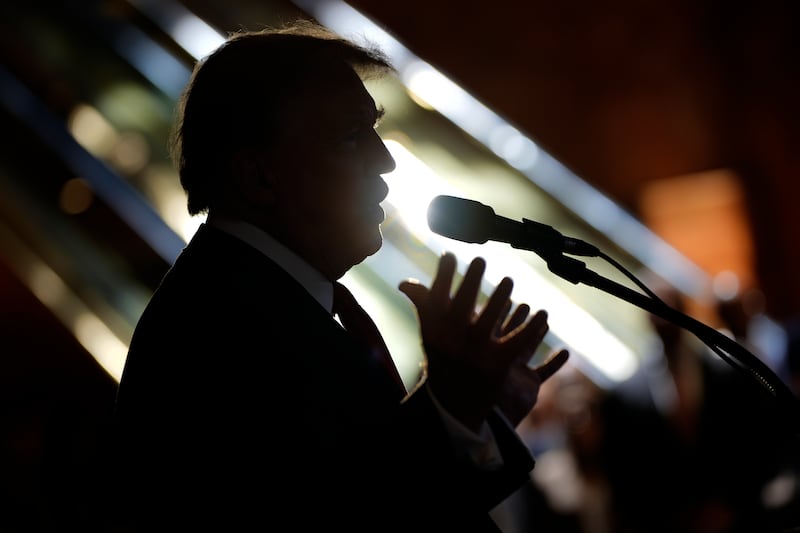When news broke that a New York jury had found Donald Trump guilty of 34 counts of falsifying business records on Thursday, making him the first former president in American history to become a convicted felon, many professional pundits and prognosticators rushed to declare the verdict politically meaningless.
“Guilty or not guilty, Trump verdict won’t sway most voters,” a PBS NewsHour headline said, citing polling the outlet conducted in partnership with NPR and Marist.
“Trump is guilty. It won’t matter at all this election,” added a columnist for USA Today.
Some even went so far as to declare the case’s outcome a net-positive for Trump before the jury had even ruled. As one Los Angeles Times columnist opined, “Even a finding of guilty on tangled charges that Trump committed business fraud to hide hush money payments to an adult film actor is likely to have only a minor effect on his standing in the eyes of most voters.”
Virtually all of these predictions relied heavily on recent polling showing that a relatively small number of voters say they would be less likely to vote for Trump if he were convicted, with most saying it would have no impact on their decision either way.
For example, the polling cited by PBS NewsHour found that only 17% of voters said that a guilty verdict would make them less likely to vote for the former president in November, while 67% said it would make no difference.
But even if we set aside the fact that pollsters have historically done a poor job of predicting how voters will actually behave in hypothetical situations, those eager to dismiss the potential impact of the verdict on the 2024 election seem to be missing a key piece of context that makes those numbers much more meaningful than initially meets the eye:
While 17% of voters may not be a huge number relative to the total size of the population, it is a massive figure relative to the razor-thin margins that have decided recent presidential elections.
Let’s look at 2020, for example. Joe Biden won the presidency with 303 electoral votes to Trump’s 235. On the surface, that sounds like a blowout, right? In the immortal words of the legendary college football coach and broadcaster Lee Corso, “Not so fast, my friend!”
Once you peek under the hood at the state-by-state results, you find that Biden won several of the decisive states by incredibly narrow margins. In Arizona, he eked out a victory by just 10,457 votes — a 0.31% margin. The gap in Georgia was only slightly wider in terms of raw votes (Biden won the state by 11,779 votes), but was actually narrower in terms of percentage (0.24%). And while it might seem luxurious in comparison to those first two states, Biden’s 20,682 vote (or 0.63%) win in Wisconsin was yet another nail-biter.
Why does this matter? Because if fewer than 43,000 votes had swung the other direction across those three states — just 0.37% of the total votes cast — then Biden’s total would have dropped below the 270 electoral votes needed to win the White House, thereby handing Trump a second term.
Given that context, and the widely shared expectation that November’s election is likely to be just as close, if not closer, it should be clear that this ascendant “nothing matters” narrative fundamentally misunderstands how little it can take to tip the scales in our polarized political landscape.
In short, if Trump’s newly minted status as America’s First Felon makes 17% of the electorate less likely to support him, it’s potentially catastrophic for his presidential aspirations.
And it could actually get worse. After all, that PBS/NPR/Marist poll is just one poll. Other recent surveys have indicated a much more challenging environment for Trump.
In April, an Ipsos poll found that, among respondents who said they were planning to vote for Trump, 16% said a guilty verdict in the New York trial would make them reconsider supporting him, while an additional 4% said they would no longer support him.
And in January, a Gallup poll found that just 23% of Americans said they would be willing to vote for a presidential candidate who had been convicted of a felony crime by a jury — with that number dropping to 21% among the independent voters whose support is so essential for any candidate’s success in a tight race. That poll did not mention Trump by name, but yikes.
Needless to say, if Trump’s conviction truly does end up disqualifying him for anywhere close to that many voters — or even if just a portion of that 20% of his current supporters from the Ipsos survey actually do end up reconsidering their support — his campaign would be dead in the water. And that’s before any of the former president’s other, more serious legal problems get resolved, which may or may not happen before Americans head to the ballot box.
Of course, it’s impossible to anticipate how any of this shakes out. We are quite literally in uncharted territory here. And as mentioned, polling’s track record of predicting future behavior is famously fraught.
But given the recent history of America’s presidential elections and the high likelihood that we’re barreling toward yet another photo finish this fall, members of the Hot Take Industrial Complex should at least give some pause before they rush out to unilaterally declare such an unprecedented event to be inconsequential.
And considering the wild and unpredictable decade of American politics we’re living through, it would behoove us all to have Corso’s signature catchphrase permanently ringing in our ears as we wait for whatever comes next.
Steve Pierce, a contributing writer for Deseret, is a Democratic strategist and communications consultant who advises campaigns, causes and brands on matters of message and strategy. He is a senior director at Bully Pulpit International, a communications firm based in Washington, D.C.



